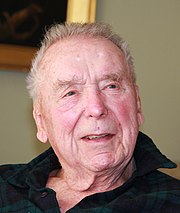Charles Snead Houston
Charles Snead Houston (August 24, 1913 – September 27, 2009) was an American physician, mountaineer, high-altitude investigator, inventor, author, film-maker, and former Peace Corps administrator. He made two important and celebrated attempts to climb the mountain K2 in the Karakoram Range.
Houston was born in New York in 1913 and grew up in Great Neck on Long Island. He was educated at The Hotchkiss School and Harvard University, and he earned a Doctor of Medicine from Columbia University College of Physicians and Surgeons.
Houston began climbing in the Alps with his big brother where they met T. Graham Brown. He then gained experience on several expeditions to Canada and America making the second ascent of Mount Foraker in 1934, with T. Graham Brown and Chychele Waterston. In 1936, Houston was a member of the British–American Himalayan Expedition led by the British climber H.W. Tilman to the top of Nanda Devi in India, the highest mountain climbed at that time. In 1938, he was the leader of the first American Karakoram expedition to K2. Although he did not reach the summit, his party mapped a route to the top that was later used by the Italian team that first summited the mountain in 1954. In 1950 Houston and Tilman led a trekking expedition to the Khumbu Glacier, just west of Mount Everest. They were the first Westerners to get there (and amongst the first mountaineers to be allowed into Nepal). They examined the Khumbu Icefall to see whether it provided a means of climbing Everest and were the first observers of the higher parts of Everest from Khumbu.
...
Wikipedia

